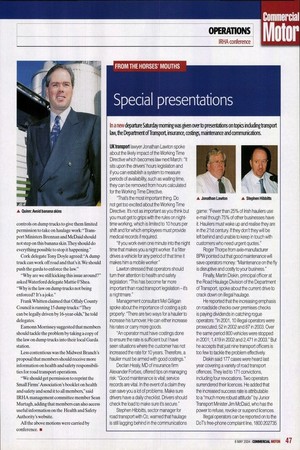Special presentations
Page 47

If you've noticed an error in this article please click here to report it so we can fix it.
In a new departure Saturday morning was given over to presentations on topics including transport law, the Department of Transport, insurance, costings, maintenance and communicabons.
UK transport lawyer Jonathan Lawton spoke about the likely impact of the Working Time Directive which becomes law next March: "It sits upon the drivers' hours legislation and if you can establish a system to measure periods of availability, such as waiting time, they can be removed from hours calculated for the Working Time Directive.
"That's the most important thing. Do not get too excited about the Working Time Directive. Its not as important as you think but you must get to grips with the rules on nighttime working, which is limited to 10 hours per shift and for which employees must provide medical records if required.
"If you work even one minute into the night time that makes you a night worker. If a fitter drives a vehicle for any period of that time it makes him a mobile worker."
Lawton stressed that operators should turn their attention to health and safety legislation: "This has become far more important than road transport legislation — its a nightmare."
Management consultant Mel Gilligan spoke about the importance of costing a job properly: "There are two ways for a haulier to increase his turnover. He can either increase his rates or carry more goods.
"An operator must have costings done to ensure the rate is sufficient but I have seen situations where the customer has not increased the rate for 10 years. Therefore, a haulier must be armed with good costings."
Declan Healy, MD of insurance firm Alexander Forbes, offered tips on managing risk: "Good maintenance is vital; service records are vital. In the event of a claim they can save you a lot of problems. Make sure drivers have a daily checklist. Drivers should check the load to make sure it's secure." Stephen Hibbitts, sector manager for road transport with 02, warned that haulage is still lagging behind in the communications
game: "Fewer than 25% of Irish hauliers use e-mail though 75% of other businesses have it. Hauliers must wake up and realise they are in the 21st century. If they don't they will be left behind and unable to keep in touch with customers who need urgent quotes."
Roger Thorpe from axle-manufacturer BPW pointed out that good maintenance will save operators money: "Maintenance on the fly is disruptive and costly to your business."
Finally, Martin Diskin, principal officer at the Road Haulage Division of the Department of Transport, spoke about the current drive to crack down on illegal haulage.
He reported that the increasing emphasis on roadside checks over premises checks is paying dividends in catching rogue operators: "In 2001, 10 illegal operators were prosecuted; 52 in 2002 and 87 in 2003. Over the same period 800 vehicles were stopped in 2001; 1,419 in 2002 and 2,471 in 2003." But he accepts that just nine transport officers is too few to tackle the problem effectively.
Diskin said 177 cases were heard last year covering a variety of road transport offences. They led to 171 convictions, including four revocations. Two operators surrendered their licences. He added that the increased success rate is attributable to a "much more robust attitude" by Junior Transport Minister Jim McDaid, who has the power to refuse, revoke or suspend licences. Illegal operators can be reported on to the DoT's free-phone complaint line, 1800 202735


























































































































































































